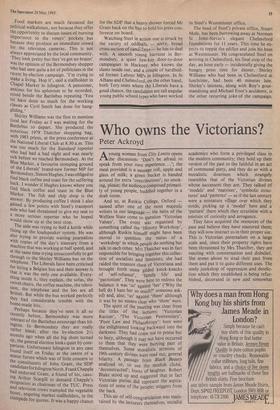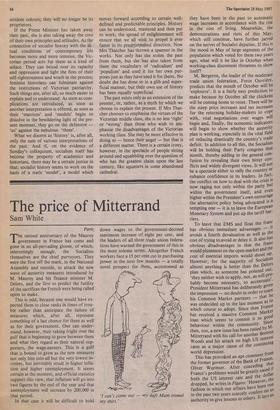Who owns the Victorians?
Peter Ackroyd
Ayoung woman from City Limits opens the discussion: 'Don't be afraid to speak from your own experience . '; the meal provided is a sausage roll, apple and glass of milk; a green bucket is handed around for extra `contributions'; no smok- ing, please; the audience composed primari-
ly of young people, huddled together in a drab room.
And so, at Ruskin College, Oxford -
named after one of the most majestic writers in our language — the heirs of the Welfare State come to question 'Victorian Values'. The event was organised by something called the 'History Workshop', although Ruskin himself might have been moved to question the status of a 'workshop' in which people do nothing but talk to each other. Mrs Thatcher was in fact responsible for bringing together this collec- tion of socialists and feminists; she had raided the treasure chest of Victoriana and brought forth some gilded knick-knacks of 'self-reliance% 'family life' and `patriotism'. They
were here to redress the balance: it was `us' against 'her' ('Why the hell do I hate her so much?' someone ask-
ed) and, also, `us' against 'them' although it was by no means clear who 'them' were.
The spirit of the meeting was clear from
the titles of the lectures: 'Victorian Racism', 'The Victorian Penitentiary', `Poor Law and Philanthropy': here were the enlightened looking backward into the darkness. They had come not to praise but to bury, although it may not have occurred to them that they were burying part of themselves. Some moralistic sermons of 19th-century divines were read out; general hilarity. A passage from
Black Beauty analysed or,
to use the modish cliché, deconstructed'; hoots of laughter. Robert Blake stood up and
suggested that in fact Victorian pieties did represent the aspira- tions of some of the people; sniggers from the back.
This air of self-congratulation was main- tained by the lecturers themselves, socialist
academics who form a privileged class in the modern community; they hold up their version of the past to the faithful in an act of communal piety, and they do so with a moralistic dourness which strangely resembles that of the Victorian divines whose successors they are. They talked of 'models' and 'matrixes', 'symbolic struc- tures' and 'patterns' — as if the last century were a miniature village over which they stride, picking up a 'model' here and a `pattern' there which they scrutinise with a mixture of curiosity and arrogance.
They have acquired the resources of the past and believe they have mastered them; they will now instruct us in their proper use. This is Victorian paternalism on a large scale and, since their property rights have been threatened by Mrs Thatcher, they are reacting with consternation and disbelief. She seems about to steal their past from them and put it to quite different uses. The seedy junkshop of oppression and derelic- tion which they established is being refur- bished, decorated in new and somewhat strident colours; they will no longer be its proprietors.
If the Prime Minister has taken away their past, she is also taking away the core of their own principles and attitudes. As the connection of socialist history with the ac- tual conditions of contemporary life becomes more and more tenuous, the Vic- torian period acts for them as a kind of solace. They can brood over its rapacity and oppression and light the fires of their self-righteousness and wrath in the process; feminist historians can fulminate against the restrictions of Victorian patriarchy. Such things are, after all, so much easier to explain and to understand. As soon as com- plications are introduced, as soon as another interpretation is offered, as soon as their 'matrixes' and 'models' begin to dissolve in the bewildering light of the pre- sent moment, they go on the defensive `us' against the nebulous 'them'.
What we discern as 'history' is, after all, only the sum of various interpretations of the past. And if, on the evidence of Sunday's colloquium, socialism itself has become the property of academics and historians, there may be a certain justice in that; socialist history seems to work on the basis of a static `model', a model which moves forward according to certain well- defined and predictable principles. History can be understood, mastered and then put to work; the spread of enlightenment will ensure that we all wish to propel it ever faster in its predetermined direction. Now Mrs Thatcher has thrown a spanner in the works. Not only has she stolen the past from them, but she has also taken from them the vocabulary of 'radicalism' and `populism' and used it for her own pur- poses just as they have used it for theirs. No doubt she has done so in a glib and super- ficial manner, but their own use of history has been equally superficial.
The past exists only as an extension of the present, or, rather, as a myth by which we choose to explain the present. If Mrs That- cher chooses to emphasise the virtues of the Victorian middle class, she is no less 'right' or 'wrong' than those who wish to em- phasise the disadvantages of the Victorian working class. She may be more effective in doing so — hence their anger — but that is a different matter. There is a certain irony, however, in the spectacle of people sitting around and squabbling over the question of who has the greatest claim upon the last century, like squatters in some abandoned cathedral.















































 Previous page
Previous page